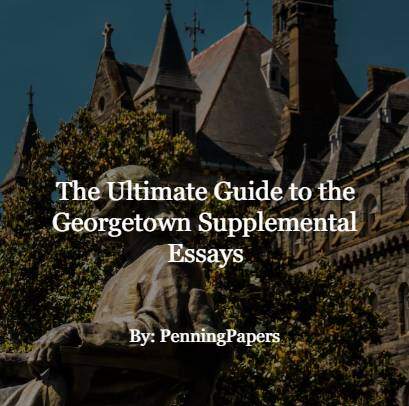The Georgetown Supplemental Essays are nothing short of long and tedious. There are four whole essays, and each requires careful attention to detail. After all, Georgetown is a competitive school. It ranked #22 in the US News and World Report and boasts a slim acceptance rate of 11.98% for the 21-22 admissions cycle.
Ouch.
That’s not all, though. According to Georgetown’s Common Data Set, the acceptance rate dipped significantly over time. And, taking into consideration the trend of increasing applicants, it doesn’t look like Georgetown’s acceptance rate is going to get any better.
We’ve made a visualized chart of Georgetown’s acceptance rate below.

Hey, doesn’t look that bad, right? Well, from the 2010-11 admissions cycle to the 2021-22 admissions cycle, the acceptance rate dropped from 20.15% – 11.98%. Georgetown’s acceptance rate was nearly cut in half within 12 admissions cycles.
1/5 just became 1/10… kind of.
Look, we know numbers don’t seem as scary. But, here’s a metaphorical photo of a partially eaten pie to symbolize Georgetown’s admissions rate.

Now, what does this mean?
It means that you’ll need to be particularly exceptional in grades, extracurriculars, and essays to get accepted. In fact, you may want to consider giving the Georgetown supplemental essays extra care and delicate editing. Why?
Well, let’s take a look back at Georgetown’s Common Data Set.

In the information above, we’ve circled two admissions decision variables that Georgetown considers “very important”. The first is, of course, the application essay; the second is the character/personal qualities section.
Attributes like character/personal qualities have no quantitative measurement. Simply put, there’s no way admissions officers can determine if you’re “good” or “bad” in the same way academic GPA does. GPA has a solid number. Personality and “vibe” doesn’t. That’s where the essay comes in.
The Georgetown supplemental essays are the primary indicator of whether the school likes your character/personal qualities. You can’t derive personal qualities from GPA, and you can’t do it from test scores or extracurriculars.
Now, we know what you may be thinking.
“Doesn’t my high GPA indicate my conscientious, hardworking personality?”
The answer is: perhaps.
But, many variables contribute to a high GPA and test scores. Perhaps you had the right tutoring. Maybe you’re gifted and talented. Or, you have a high mental processing speed. These may explain your academic ability; however, they can only very briefly depict a low-resolution image of your character and personal qualities.
Most of your character and personal qualities will be assessed through the essay.
Writing the Georgetown supplemental essays perfectly is not just about how you write. It’s what you write between the lines. It’s not just the character and personality traits you say you have; it’s the traits Georgetown’s admissions officers can infer based on analyzing the themes and motifs of your writing.
Fortunately, we will cover exactly how to write your Georgetown supplemental essays well enough that your best qualities will shine. This guide will serve to show you everything you need to answer each prompt well and stand out amongst the rest of the admissions pool.
In addition, if you feel like you can’t write the Georgetown supplemental essays well enough to stand out from the rest of the application pool, you may want to consider speaking with one of our college admissions advisors and consultants. Our professionals have helped many students get accepted into highly competitive universities around the world by helping them write powerful stories.
So, without further ado, let’s get started.
Professional College Application Help.
Contact us. We'll get to you within 24 hours.
Table of Contents
- Prompt 1: Indicate any special talents or skills you possess. (250 words)
- Prompt 2: Briefly discuss the significance to you of the school or summer activity in which you have been most involved. (approximately 1/2 page, single-spaced)
- Prompt 3: As Georgetown is a diverse community, the Admissions Committee would like to know more about you in your own words. Please submit a brief essay, either personal or creative, which you feel best describes you. (approximately 1 page, single-spaced)
- Georgetown University School-Specific Prompts
- Georgetown College: What does it mean to you to be educated? How might Georgetown College help you achieve this aim? (Applicants to the Sciences and Mathematics or the Faculty of Languages and Linguistics should address their chosen course of study.)
- School of Nursing & Health Studies: Describe the factors that have influenced your interest in studying health care. Please specifically address your intended major (Global Health, Health Care Management & Policy, Human Science, or Nursing).
- Walsh School of Foreign Service: The Walsh School of Foreign Service was founded more than a century ago to prepare generations of leaders to solve global problems. What is motivating you to dedicate your undergraduate studies to a future in service to the world?
- McDonough School of Business: The McDonough School of Business is a national and global leader in providing graduates with essential ethical, analytical, financial and global perspectives. Please discuss your motivations for studying business at Georgetown.
Prompt 1: Indicate any special talents or skills you possess. (250 words)

Funnily enough, out of all the Georgetown supplemental essays, this one seems to be the hardest one. Why? Well, we’re not sure. Students seem to have the most questions about this one, though!
Here’s a tip. Think outside the box.
Chances are, if you’re applying to a school like Georgetown, you’re like a cougar. You’re ready to pounce at the opportunity to talk about your talent in tennis, skill in Rubix cubing, or whatsoever extracurriculars you’ve had primed and ready to impress admissions officers.
But, slow down!
The Georgetown skills and talents essay shouldn’t be approached so carelessly. Instead, take the time to consider the talent or skill you have, and perhaps some of the underlying skills they actually demonstrate.
Let’s take a look back at the tennis example.
Can tennis be a talent or a skill? Sure! But, what characteristics and attributes are there to tennis? Or, better yet, what characteristics or attributes did you need to adopt in order to become competent at tennis? Well, one of the classic experiences of tennis is conditioning; and, everyone knows what conditioning feels like. You wake up at 5:30 AM when your parents aren’t even awake yet to shovel down breakfast, pack your bag, and rush toward campus in the bitter winter.
So, maybe your talent or skill is in tennis. But, if you look deeper into your unique experiences, you may realize the skill that stands out more to you is the “ability to, against all logic and reason, pull yourself from the comfort of your bed and embrace the bitter cold to achieve your dreams.”
You can apply this principle to any other extracurricular activity you’ve conducted.
Chess? Maybe it’s less about dominating the board and more about overcoming the emotional turmoil of sacrificing valuable pieces to make incredible gains. (Queen’s gambit.)
Maintained a vegan diet for 3 years? Perhaps your skill is less about being healthy and on a deeper level about how you can fulfill promises you make to yourself despite temptation. (plant-based food instead of big, juicy, and fatty burgers)
Prompt 2: Briefly discuss the significance to you of the school or summer activity in which you have been most involved. (approximately 1/2 page, single-spaced)

If there’s anything we could recommend about this section, it’s to focus on one attribute of the school or summer activity. You’ll need laser focus for this one: think surgically.
Now, why is that?
Well. take a look at the word count. Like some of the other Georgetown supplemental essays, prompt 2 doesn’t actually have a word count. Instead, it’s approximately 1/2 of a page single-spaced. That’s quite a bit of space.
But, just because you have a bit of room to fit more into your essay doesn’t mean you should just write carelessly about anything. Instead, remember to stay focused on the prompt at hand. The prompt is asking you to briefly discuss the significance to you of the activity.
Thus, you’ll need to ask yourself why the activity was meaningful or important to you. That means digging deep and deconstructing some of the themes and motifs of the topic you choose to write about.
So, let’s take an example.
You want to write about volunteering to provide food for the homeless during the summer. It was hot, your mom kept telling you to be careful in that covertly-afraid-of-poor-people-but-don’t-want-to-admit-it sort of way, and it took quite a lot of labor to get through the whole process.
Why would this experience be significant to you? Well, the obvious answer would be the PR-approved response: “This is meaningful to me because it allows me to uplift marginalized people…”
And, well, it’s not wrong. But, let’s also take competition into consideration. If other people are applying to Georgetown who also happened to undertake altruistic projects, what do you think they’ll say is the significance of the experience? That’s right: they’ll be giving a similar response.
If you want to truly stand out when answering the second Georgetown essay prompt, you’ll need to find significant elements of your activity that are not initially obvious. Ask yourself this: what else about this activity makes it significant to me? A good place to start is how the activity helped you grow as a person.
So, let’s look back at the volunteer example.
What do you think is going to be valuable about one’s experience working as a volunteer to help feed the homeless during the summer? Well, one thing is that it’s a great reality check for those with altruistic intentions. We hear it all the time: “I started a non-profit to help marginalized people!” But, how many of those “non-profits” that students founded actually help people? The answer is very few.
Why is that? It’s because few non-profits that have good intentions are willing to do the “dirty work” to see success. They’re often interested in the “idea” of helping people, but fail to realize just how much back-breaking labor goes into truly helping.
The value of an experience like this is in learning just how much work it takes to help a few individuals. It’s a grounding reality check that will give you the perspective needed to tackle future projects at Georgetown with wisdom and careful steps.
Prompt 3: As Georgetown is a diverse community, the Admissions Committee would like to know more about you in your own words. Please submit a brief essay, either personal or creative, which you feel best describes you. (approximately 1 page, single-spaced)

The Georgetown essay prompt 3 is… quite confusing.
Is this a diversity essay? Is it a personal experience essay? Or, is it a creative essay?
Well, it’s sort of all three at once. This essay question is phrased in a way for Georgetown’s admissions officers to understand more about how your diverse background could contribute to their school. But, it’s also a time for you to take creative liberty. At the same time, you have the choice to open up about any personal topic that you think best describes you.
Think of it as your admissions officer going to a restaurant and, instead of making a specific order, they tell the server, “surprise me!”
Now, you may start to realize that doesn’t really put you in a good position. After all, this essay question is too vague for you to have any actionable approach. So, how should you answer this question?
We recommend focusing more on the last part. “…a brief essay, either personal or creative, which you feel best describes you.” If you can find a personal experience or story in your life that describes the kind of person you are, great. If you have a creative way of showing what kind of person you are, that’s fine too!
There’s just one rule we’re going to put here. Georgetown’s third essay prompt requires you to SHOW don’t TELL. This is absolutely crucial. One of the biggest mistakes applicants make trying to answer this question is in trying to serve admissions officers the “answer.” That’s not for the student to decide. The admissions officers decide what kind of impression they have of you.
Let’s look at this principle in action. Take these two excerpts for example.
“It was the last minute before the end of the game, and despite how exhausted I was I managed to steal the ball and float in the air. It felt like time had stopped; but, I made it. I did it. Boom! I landed the shot, and secured for our team a tie rather than a loss. But, to us, we were victorious.
I believe this experience best encompasses my hard working and compeititve nature; when the moment calls for it, I am ready to apply everything I can to reach toward the stars. And, at Georgetown, I will use this passion to reach my goals.”
Example Excerpt 1: Georgetown supplemental essay prompt 3
“Somewhere out there, in the field, in a suburb, someone kicked a ball into a goal and the whole crowd proceeded to cheer as the student, in perfect victory and triumph, bumps their chest.
Was that me? Well, no. Kind of?
Maybe it was.
Actually, that was me 2 years ago; but, not today. Yet, I know events like these are talked about during just about every “story time” between students and their parents. It’s the quintessential bragging story that follows the same archetypal format of obstacle followed by triumph; or, as many parents like to say it, “my little boy, you should’ve, like, seem him y’know? It was the final minute of the quarter and everyone was cheering and he pushed at the last moment and oh my goodness gracious he did the thing! He did the thing! You saw it too honey, right? Oh my gosh he did the thing!” to which mother smiles a “uh huh” and brings forth a generous plate of mozarella sticks for “her honey” and “the boys.”
It’s not like I’m looking back at these experiences in remorse. No, if anything, I enjoy it. Yet, I think there’s a lot more to the feeling that people don’t talk about. There’s the feeling of camaraderie when you’re doing all you can for your team, for your family, and to some level even putting your all for the opposing team. They deserve it. It’s worth it. Yet, it’s not comprehensible within the limitations of language.
It’s just the feeling you communicate when you pass by your teammates with the ball and look them in the eyes whilst they reciprocate. It’s a half second. No, less than that. Yet, there’s so much emotion during these games that is passed in just a few seconds. And, well, it does feel great: the taste of victory. But, that, like most things in life, will pass. I know what that feeling of victory is like; yet, there’s a somber grief at loss. But, in some contradictory gymastic against logic and reason, there’s an appreciation for that grief. There is no good or bad with it. There’s just the fleeting moment of looking at another’s eyes before a big play, the feeling of recognizing victory and loss, and the feeling of just being.
Just to be. Just is.
It’s beautiful.”
Example Excerpt 2: Georgetown supplemental essay prompt 3
In the first example, the excerpt gives the answer to the admissions officer right away. It says what kind of person and identity the writer has. But, the second one talks more about the experiences and feelings that go with it. What we make of the reader is up to the admissions officer to infer.
We can infer from the second paragraph that despite a competitive nature, the writer has a compelling thought process that demonstrates an appreciation for the smaller things in life. Despite the grandiose nature of sports events and goals, the writer is able to show that they can still let their minds appreciate the subtler things.
This, however, is not explicitly stated in the application essay. Instead, it’s demonstrated through the writing shown. Be sure to implement this principle in your essay as well.
Show your identity and the character that best describes you in your essay; but, don’t directly tell it to admissions officers like in the first example. Your readers will infer it.
Georgetown University School-Specific Prompts

Now that we’ve covered the first 3 prompts, let’s look at the school and major-specific Georgetown supplemental essays.
(Each school-specific prompt should not exceed 1 page, single-spaced)
Georgetown College: What does it mean to you to be educated? How might Georgetown College help you achieve this aim? (Applicants to the Sciences and Mathematics or the Faculty of Languages and Linguistics should address their chosen course of study.)
This is a difficult essay prompt.
When Georgetown asks you what it means to be educated, your initial response may be to look at the first couple of results on Google. Or, “Hey Siri, what does it mean to be educated?”
If you’ve done any of this, you may actually realize that the responses to “what does it mean to be educated?” are very diverse. No one really has a solid answer. Everyone’s perception of what it means to be educated varies drastically.
For some, it means becoming smarter and knowing more “stuff.”
For others, it means being socially aware and becoming a more suitable citizen who can provide value to the world.
If you’re struggling to answer Georgetown’s “what does it mean to be educated?” prompt, we highly recommend asking yourself this: “How would society as a whole benefit most from being educated?” If you ask yourself this question, you’ll start to discover that being educated as to be more than just “knowing stuff”, being certified for a career, and being an informed citizen.
Think about the way that education can actually help other people’s lives and make them overcome their insufficiencies. How? Then, translate that principle to your own life.
Here’s an example.
Let’s say you’re dissatisfied with the state of education. What is it that it’s lacking? Well, everything… right? After all, people always say they wish they learned “x” and “y” in school. Everything from fixing cars to doing taxes isn’t involved in school. But, what do people need to learn? Individual good-to-know skills? Perhaps. However, it’d be much better if schools could help people learn how to solve a set of all problems. That means learning problem-solving skills and individuality as a whole. That way, people can handle whatsoever problems come to them since they’ll learn the personality and temperament needed to solve the set of all problems.
If you can see other people succeeding in life because of this, think of how that would help your own life. Noticing the way education can help others may help you notice how you can benefit as well. Then, consider how Georgetown in particular can help you achieve that.
School of Nursing & Health Studies: Describe the factors that have influenced your interest in studying health care. Please specifically address your intended major (Global Health, Health Care Management & Policy, Human Science, or Nursing).
Empathy.
Yup, that’s going to be the big problem with this prompt. There’s nothing wrong with empathy in and of itself; but, most if not all Georgetown applicants will be writing about empathy in their School of Nursing & Health Studies essay.
Well, realistically, it’s not just the Georgetown supplemental essays. Empathy is a common topic across all college essays.
If you have something else to write about, fantastic.
But, if you insist on writing about empathy, that’s fine too. The key here is just to make sure that you’re able to write your essay in a manner that will stand out from the rest of the admissions pool.
This is where drawing from your own personal experiences will be unbelievably useful.
“But, everyone else is also drawing from their experiences, right?”
Yes. But, the key is not in talking about the individual experiences that influenced you to study health care. Instead, you want to dig into the imagery and smaller details of your experience. In other words, don’t just tell them about the factors that influenced your interest in health care. Focus on what they were like and what it felt like.
Let’s say you, like many others, were motivated to pursue Nursing because you saw the kinds of work that your parents did and felt inspired by the sense of empathy and compassion in helping others. Instead of just telling admissions officers that you felt empathy and compassion for people upon seeing your family helping others, explain what feeling the surge of empathy and compassion was like.
What is it like to truly look up to a career where you know you’ll be capable of helping others? What goes on in your head every time you hear stories of people recovering? Is it happiness? What kind of happiness? Deconstruct it and dig through your feelings and emotions at the micro level. When you do this, you’ll have a much more complete essay that has more in-depth answers that will stand out from the rest.
Walsh School of Foreign Service: The Walsh School of Foreign Service was founded more than a century ago to prepare generations of leaders to solve global problems. What is motivating you to dedicate your undergraduate studies to a future in service to the world?
This is deceivingly simple. But, be warned: the Walsh School of Foreign Service essay isn’t as easy as it looks.
Why? Well, that’s because there’s a very big trap here.
Students read “…prepare generations of leaders to solve global problems…” and “…your undergraduate studies to a future in service to the world?“
This can make people imagine that they need to have some kind of profound ability to change the world just from their undergraduate studies alone. In reality, an undergraduate education, no matter, where it comes from, is only going to scratch the surface of helping solve world problems. After all, if it were the case an undergraduate could truly solve world problems with their level of expertise, we’d have a problem-free society!
So, it’s important to answer this question by grounding it in reality. You should answer the Walsh School of Foreign Service by giving a more realistic approach. When you write about what motivates you to dedicate your studies to a future servicing the world, don’t make claims like how your studies will make sweeping changes.
Instead, write about the potential your education will have in preparing you to truly change the world. Your education at Georgetown should be supplemental to the main plans you have in making a positive impact on the world. If you can depict this to admissions officers by being specific with how you’ll reach your goals, the admissions officers are more likely to take your claims seriously.
What motivates you can be the potential to leave a positive impact on the world, sure. But, it needs to be hyper-specific so that admissions officers will believe you. Don’t rely on vague language.
McDonough School of Business: The McDonough School of Business is a national and global leader in providing graduates with essential ethical, analytical, financial and global perspectives. Please discuss your motivations for studying business at Georgetown.
Business essays aren’t easy.
After all, it’s hard to tell Georgetown why you’re motivated to study business other than, “I like money.” You can see this problem in other mediums as well, such as job applications. “Why do you want this job?” can be very easily answered with, “I need to get paid and don’t want to get evicted from my apartment.”
But, not all hope is lost. You can approach Georgetown’s business essay in a creative way. First, before you even begin answering the question, you may want to start by answering this: why is business important? Think less about the money and the physical change. Think more about the theoretical and metaphysical ways business helps people.
- Business helps people develop the financial independence needed to have freedom.
- Business helps with innovation to bring humanity forward and therefore minimize unnecessary suffering.
- Business is, for some families, cultural defiance against historic oppression. (Chinese capitalism as a form of restorative justice against the past sins of communist rule under Chairman Mao)
As you can see, business is more than just money. There are many ways a business can influence people’s lives, and much of it is metaphysical. Think from a more analytical and symbolic perspective instead of a physical and straightforward one.
When you’ve found one element to focus on that is unique and stands out from the rest, remember to connect that with how Georgetown’s resources will help you.
If you have any other questions about how to write the Georgetown supplemental essays, don’t be afraid to contact us for a free consultation! Our college admissions advisors and consultants have helped students write unique and powerful essays that helped them get accepted into top universities around the world including those of the Ivy League. We’ll also get back to you within 24 hours.

